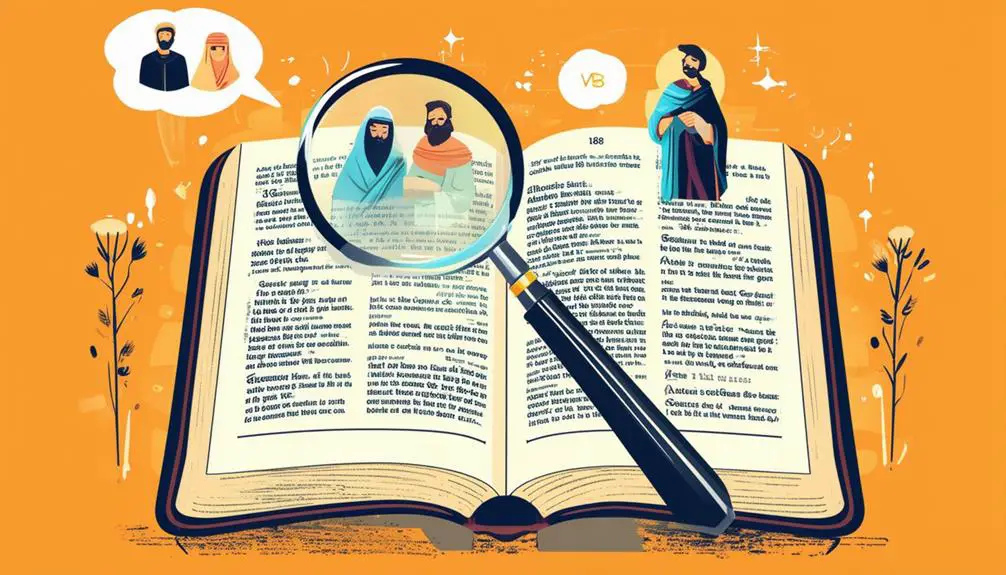Dive into Genesis 18, exploring Abraham's hospitality, divine revelations, and ethical dilemmas while unveiling layers of faith and divine-human interactions.

Bible Study – The Book of Genesis – Chapter 18 – Summary and Analysis
In Genesis 18, you'll see Abraham exemplifying outstanding hospitality to three divine visitors, marking another level of God's covenant with him. You'll encounter God revealing His plans, including Abraham's promised son through Sarah and the impending doom of Sodom. Sarah's laughter represents doubt, but the unfolding narrative accentuates God's faithfulness. You'll witness Abraham's profound intercession for Sodom, shedding light on his righteous character. Deciphering the symbolism, themes, and intricate details of this chapter offers more than meets the eye. As you keep exploring, you'll reveal the depth of faith, divine-human interaction, and ethical dilemmas enveloping this biblical story.
Key Takeaways
- Genesis 18 highlights Abraham's exceptional hospitality, which leads to a divine visitation and the reaffirmation of God's covenant.
- God reveals His plans to Abraham, promising a son through Sarah and foretelling the destruction of Sodom and Gomorrah.
- Abraham's intercession for Sodom showcases his righteousness and the power of prayer, emphasizing the importance of advocating for justice.
- Sarah's doubt, reflected in her laughter at the promise of a son, underscores human skepticism and the transformative power of faith.
- This chapter reaffirms God's faithfulness in fulfilling promises, emphasizing the importance of patience, faith, and obedience in divine-human relationships.
Understanding Genesis Chapter 18

Diving into Genesis Chapter 18, you'll uncover a rich tapestry of biblical narratives and teachings that require thorough exploration and analysis for in-depth understanding. The Abrahamic Generosity and Divine Revelations are two pivotal themes that stand out.
The first theme, Abrahamic Generosity, is strikingly pronounced in the chapter. Abraham's open-heartedness in hospitality is commendable. He rushes to welcome three strangers, offering them the best he has; a fine calf, cakes of fine meal, and a place to rest under the tree. This generous act is a model of hospitality that has been handed down through generations, highlighting the importance of kindness and generosity to strangers.
Secondly, the Divine Revelations become apparent as the narrative unfolds. God reveals His plans to Abraham, solidifying their unique relationship. The revelation here is twofold: the promise of a son through Sarah, and the impending doom of Sodom and Gomorrah. These revelations underscore the concept of God's commitment to His promises and His justice, both of which shape the trajectory of the biblical narrative.
Genesis 18, therefore, offers you valuable insights into themes of generosity, divine revelations, and the consequences of human actions.
Abraham's Divine Visitors
In the narrative of Genesis 18, you'll notice that Abraham's encounter with his divine visitors is not only a demonstration of his unmatched hospitality, but also a pivotal moment in the unfolding of God's divine plan. This encounter is a clear example of Abraham's faithfulness, an attribute that God acknowledges and rewards.
The divine appearances are significant in multiple ways. They affirm Abraham's chosen status and set the stage for the continuation of God's covenant with him. The visitors are not mere guests, but divine messengers, acting as conduits of God's will.
Below is a table to help you visualize the key elements of this story:
Element |
Description |
Significance |
|---|---|---|
Divine Visitors |
Three men appear to Abraham |
Their divine nature is revealed in their knowledge of God's plan |
Abraham's Hospitality |
Abraham rushes to serve them |
Demonstrates his faithfulness & respect for God |
Divine Message |
They predict Sarah's pregnancy |
This is a promise from God, implying his chosen status |
Abraham's Reaction |
He listens and believes |
Demonstrates his faith & obedience |
Through this episode, we see Abraham's faithfulness in action, and the ways divine appearances serve God's larger plan. This story sets the foundation for the fulfillment of God's covenant.
The Promise of Sarah's Son

Remarkably, the promise of Sarah's son, as mentioned in Genesis 18, isn't just an isolated event; it's a monumental turning point in the narrative that underscores God's faithfulness and the unfolding of His divine plan. This promise affirms the divine timing and orchestrates the events that will shape the future of a nation. Now, consider Sarah's faith, which, at this juncture, is yet to be fully revealed and tested.
Sarah's faith becomes a central theme in this narrative, the depth of which is gradually uncovered as the story unfolds. This promise challenges Sarah's faith and pushes her to question the limits of what's possible. The promise of Sarah's son isn't merely about a biological miracle; it's about God fulfilling His word against all odds.
The timing of this promise also highlights divine timing. God's promises aren't bound by human constraints or logic; they're governed by His perfect timing. This isn't just about Sarah and her son; it's about the entire lineage that will descend from this promised child, shaping a spiritual legacy that spans generations. In essence, the promise of Sarah's son in Genesis 18 is a testimony to God's faithfulness, divine timing, and the pivotal role of faith in realizing His promises.
Sarah's Laughter and Doubt
In Genesis 18, you encounter Sarah's laughter, a response that perhaps mirrors your own skepticism when faced with divine promises that seem beyond the scope of possibility. It's not just a laugh, but an embodiment of doubt, casting a shadow over the certainty of divine intervention. This skepticism, coupled with the subsequent denial of her laughter, sets an intriguing stage for a deeper exploration of faith, doubt, and the human response to the divine.
Doubting Divine Promises
One might find it intriguing how Sarah, the wife of Abraham, wavered in her belief when confronted with a divine promise that seemed too implausible to be true. This episode reflects the quintessence of promised skepticism and divine doubt. Sarah, despite being a matriarch in the Abrahamic faith, wasn't immune to doubts. The promise of a child in her old age was met with incredulity, demonstrating how even the faithful can question divine promises. This skepticism, while human, also serves as a lesson. It reveals the necessity for unwavering faith in God's word, even when it defies human logic or understanding. Sarah's doubt, then, is not just a personal failing, but a touchstone for all believers grappling with divine promises that challenge human comprehension.
Laughter of Skepticism
Sarah's laughter, a manifestation of disbelief and skepticism, serves as a tangible symbol of humanity's struggle to reconcile the divine with the mundane. This skepticism originates from Sarah's struggle to believe the divine promise of a son in her old age. The laughter symbolism, linked to doubt and disbelief, provides insight into human skepticism towards God's supernatural promises.
Analyzing her laughter, you'll find a poignant reflection of the human tendency to confine Divine possibilities within human limitations. It's a skeptical response, marked by incredulous laughter, to God's promise which seemed impossible in human terms. This incident, hence, not only highlights the origins of skepticism but also the transformative power of faith that eventually leads to the realization of God's promise, overriding human doubt and skepticism.
God's Covenant With Abraham

Delving into Abraham's divine pact, you'll find it's a pivotal moment that solidifies his relationship with God and sets a precedent for future biblical covenants. Abraham's faith is tested and proven strong as he accepts this covenant, demonstrating his unwavering loyalty and commitment to God. The significance of the covenant lies not only in its affirmation of Abraham as God's chosen one but also in the promise it makes of a multitudinous progeny and a promised land.
The covenant's emotional impact is immense, and can be considered through:
- The joyous anticipation of a promised child.
- The awe-inspiring realization of being chosen by God.
- The humbling enormity of the responsibility Abraham must undertake.
The covenant is a complex interplay of divine assurance, human faith, and future implications. It's not merely a contract, but a bond that melds the human and the divine, forever entwining their fates. It's a solemn promise that echoes through the ages, shaping the course of biblical history and Abraham's descendants. It's a confirmation of the power of faith, the significance of divine providence, and the indomitable spirit of mankind.
Abraham Intercedes for Sodom
While you're still marveling at the depth of Abraham's faith showcased in the covenant, the narrative shifts to an episode where Abraham's righteousness takes center stage as he intercedes for the city of Sodom. This is an important moment in Genesis, where the motif of 'Intercessory Prayer' becomes prominent.
In this context, God reveals Sodom's fate to Abraham, sparking a dialogue that illuminates Abraham's character and his relationship with God. Abraham's response isn't one of quiet acceptance but of active intercession. He challenges God's justice, asking if He would spare the city if fifty righteous people are found within it. God agrees, leading Abraham to decrease the number gradually down to ten, showcasing not only his negotiation skill but also his deep concern for the innocents within the city.
This episode underscores Abraham's role as a prophet and the potency of righteous intercession. It also raises pertinent questions about divine justice and mercy, echoing forward into the New Covenant. For you, as a reader, it's a profound lesson about the power of intercessory prayer, and the responsibility of the faithful to plead on behalf of others.
Importance of Hospitality in Genesis 18

In Genesis 18, you'll find that hospitality plays a significant role, particularly with Abraham's actions. His notable hospitality, which extends to strangers who turn out to be divine figures, underscores the biblical assertion of hospitality as a virtue. This incident not only emphasizes the importance of hospitality in personal ethics, but also its potential to lead to divine encounters and blessings.
Abraham's Notable Hospitality
Abraham's exemplary display of hospitality in Genesis 18 serves as a pivotal moment in Biblical narrative, underscoring the significance of this virtue in ancient Near Eastern culture. Abraham's generosity is striking as he welcomes three strangers into his home with no hesitation. His compassionate hosting is demonstrated by his immediate offer of refreshment and rest.
This passage elicits several emotions:
- A sense of admiration for Abraham's immediate and extravagant hospitality
- A feeling of aspiration to embody such generosity and compassion in our lives
- An appreciation for the value of hospitality in fostering connections and communication.
Analyzing this passage, it's clear that Abraham's hospitality wasn't simply a cultural expectation—it was a deeply ingrained virtue, integral to his character. This chapter challenges us to reflect on the depth of our hospitality, urging us to extend kindness beyond mere obligation.
Divine Encounters and Hospitality
Delving deeper into Genesis 18, you'll find that the crucial role of hospitality extends beyond mere human interaction—it's also significant in divine encounters. This is clearly illustrated when Abraham receives Angelic Visitations. Hospitality, in this scenario, becomes a conduit for Divine Communication. Abraham's readiness to serve the strangers not only symbolizes his kindness but also his openness to God's message. The hospitality bestowed is rewarded with promises of blessings, cementing its importance. In an era where divine messages could be missed, Abraham's attentiveness and hospitality became essential. Genesis 18 is a profound reminder that hospitality should not be confined to the sphere of human relationships, but should also extend to our relationship with the divine.
Themes and Symbolism in Chapter 18
Exploring Genesis Chapter 18, you'll uncover a wealth of symbolism and recurring themes that provide profound insight into the text's deeper meanings. The 'Angelic Visitation' is a pivotal event that signifies imminent change and divine intervention. It's a symbol of divine favor, where the heavenly sphere intersects with the human experience.
The 'Covenant Renewal' is another central theme, embodying God's unwavering commitment and fidelity to His words and promises. The themes of faith, obedience, and divine-human interaction are woven seamlessly into the narrative, providing a rich tapestry of theological and moral implications.
Consider the following:
- The Angelic Visitation not only represents divine communication but also a test of Abraham's faith and hospitality.
- Covenant Renewal implies God's faithfulness, setting the stage for the fulfillment of His promises.
- The dialogue between Abraham and God showcases the depth of their relationship, symbolizing the potential for intimate communication and negotiation with the divine.
These themes and symbols in Genesis 18 not only deepen our understanding of the biblical narrative but also invite us to reflect on our personal faith journeys. They challenge us to cultivate an open heart for divine encounters and to trust in the enduring power of God's covenant.
Interpretation of Genesis Chapter 18

In your journey through Genesis Chapter 18, you'll find that interpreting it involves not only understanding the text at face value; it's about delving into the context, the symbolism, and the overarching themes that resonate throughout the narrative. The Abrahamic Faith is one such theme that runs deep in this chapter, with Abraham's character embodying faithfulness to God, hospitality, and righteousness.
Understanding the Genesis context is essential to fully appreciate this chapter. It's set within a patriarchal society, where God's promises are often tied to progeny and land. The narrative of Abraham's conversation with the divine visitors reflects this context, presenting theological concepts subtly embedded in the daily life and culture of the time.
Analyzing this chapter, you'll notice that the narrative's simplicity belies its depth. Abraham's hospitality to strangers, his intercession for Sodom, and Sarah's laughter all convey profound messages about faith, righteousness, and divine promise. Additionally, the dialogue between Abraham and God illustrates a transformative relationship, where Abraham's faith doesn't preclude him from questioning God's justice. Hence, Genesis 18 isn't merely a historical or cultural snapshot; it's a rich tapestry of faith, ethics, and divine-human interaction.
Reflections on Genesis 18's Teachings
Reflecting upon Genesis 18, you're invited to ponder Abraham's hospitality and its implications for your own interactions. Consider the fulfillment of divine promises as documented in this chapter, and what it suggests about faith and patience. These teachings, embedded in the fabric of this biblical narrative, offer rich insight into personal and spiritual growth.
Interpreting Abraham's Hospitality
Diving deep into Genesis 18, you'll find Abraham's hospitality towards his divine guests becomes a powerful demonstration of faith and reverence. This act illustrates Abraham's generosity and carries profound religious implications.
- His readiness to serve these strangers exhibits the virtue of caring for others.
- His humble demeanor, despite his wealth and status, provides a model of humility for believers.
- His immediate recognition of the divine within his guests demonstrates a deep, unshakeable faith.
In analyzing Abraham's hospitality, we're given a lens through which to ponder our own actions and intentions. His example challenges us to extend kindness, recognize the divine in others, and maintain faith, even when life's circumstances seem challenging.
Divine Promises Fulfilled
Genesis 18 also offers profound insights into the fulfillment of divine promises, prompting you to contemplate the nature of faith, patience, and divine timing. The narrative showcases the profound interplay between promise fulfillment and divine intervention. The promise made to Abraham and Sarah wasn't fulfilled immediately. It required patience, highlighting the importance of divine timing.
Divine intervention often operates beyond human understanding or control. It's through Sarah's laughter that you're made to grasp the enormity of the promise given, and the seeming impossibility of its fulfillment. Yet, 'Is anything too hard for the LORD?' (Genesis 18:14) is a rhetorical question that emphasizes the omnipotence of God. This chapter, therefore, invites you to trust in God's timing, and to hold on to faith, even when promise fulfillment seems impossible.
Frequently Asked Questions
What Is the Historical Context of Genesis Chapter 18?
In Genesis 18, you're stepping into an era of divine hospitality and cultural etiquettes. This chapter depicts Abraham's encounter with three celestial visitors. It's set in a time when hospitality was of utmost importance. This historical context not only reflects societal norms of that period but also hints at divine intervention. You'll see a blend of human culture and divine revelation, providing a unique snapshot of the spiritual and societal dynamics of the time.
Are There Alternative Interpretations of Sarahs Laughter in Different Sects of Christianity?
Yes, there're alternative interpretations of Sarah's laughter in different Christian sects. From a feminist perspective, it's seen as an act of defiance or disbelief. Cultural interpretations vary too. Some view it as a natural response to divine absurdity, others as a sign of her human frailty. It's important to remember that interpretations often reflect the cultural and societal norms of the interpreting body.
How Does Genesis Chapter 18 Influence Modern Christian Practices?
Genesis 18 shapes your Christian practices like a potter's hands on clay. It's about hospitality lessons, not just opening your home, but your heart. You're reminded to welcome others, for in doing so, you may be entertaining divine encounters unknowingly. It encourages you to be like Abraham, extending kindness and generosity. So, in your everyday life, you're not just reading about hospitality, you're living it. It's not just history, it's an influence.
What Are the Parallels Between Genesis 18 and Other Biblical Chapters?
In Genesis 18, you'll notice parallels with other biblical chapters, particularly those involving angelic visitations and divine hospitality. For example, you'll see similarities with Luke 1, where Gabriel visits Mary. Both instances demonstrate God's direct intervention in human affairs. Divine hospitality is echoed in Matthew 25, where Jesus encourages welcoming strangers. You'll understand how these themes interweave, enhancing your comprehension of the Bible's overall message.
How Have Scholars Reconciled the Issue of Abrahams Age in Genesis Chapter 18?
You're likely aware that Abraham's longevity in Genesis 18 has puzzled many. Scholars have reconciled this by studying Biblical lifespans, which often exceed our modern ones. They've suggested that these lifespans aren't literal, but symbolic, expressing the person's importance. So, they argue, Abraham's advanced age reflects his status as a patriarch, rather than his physical age. These interpretations align with the cultural and historical context of the biblical text.



Sign up